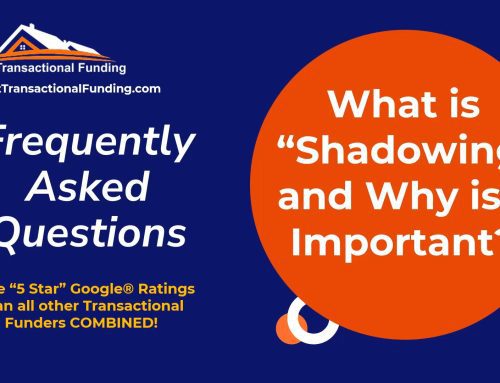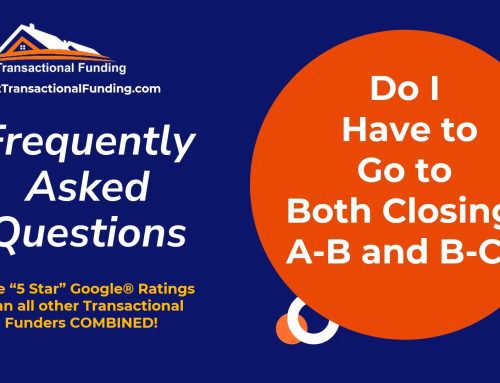 As soon as I think I have seen it all something new pops up. When I do transactional funding for wholesale same-day double closings I meet literally hundreds of closing agents and closing attorneys across the country. Every once in a while, I have some interesting feedback about their closing practices.
As soon as I think I have seen it all something new pops up. When I do transactional funding for wholesale same-day double closings I meet literally hundreds of closing agents and closing attorneys across the country. Every once in a while, I have some interesting feedback about their closing practices.
Very often a new investor gets confused about the specifics of the closing cycle. I can help because I have done thousands. Investors are eager to listen and learn especially when they have serious profits at stake. If the closings don’t happen everyone from the investor to the end-buyer loses everything.
The closing agent should be the focal point of the transaction always working with all the parties to get the deal to close. Unfortunately, the actual people doing the closings may be paid hourly. With little incentive to do more than is minimally required, the closing person can be set in his/her ways about how they are willing to do the double closings. This is especially true if the investor isn’t familiar with the closing process and who funds what parts of the closing cycle.
Some of these closing agents are so set in their ways that they flat say “no” to practices that are very commonly done by other closing agents perhaps a few hundred yards away.
Being specific about what you want done in a double closing, assignment of contract or with a Joint Venture (“JV”) Agreement is critically important. As an example, I had a new investor call me about transactional funding who needed the funds in two days.
My process is very simple, I have the investor send me the A – B and B – C signed contracts and then tell the closing agent to copy me on correspondence for the closing. The reason for the copies of the purchase and sale contracts is to give me information that will be critical to the closing. This includes the Seller, Buyer/Investor, the End-buyer, closing agent(s) and information about the property. I then call the person doing the closing and explain that I will be funding 100% of the money due from the investor on the A – B leg and I get paid back from the B – C closing leg.
In this case the investor had contacted a closing agent she was referred to and said the closing would be an “A-B-C” transaction. The closing agent responded that her attorney-owned firm could not legally do this type of closing and there were no exceptions. This left the investor with having to do a double closing at two different closing agents which may be workable, but it can be risky for a transactional funder. This problem of agents not wanting to do double closings is not uncommon and often misguided. Double closings are important when the profit spread is large or secrecy of the sale by the investor is important. Too large a profit is in “the eyes of the beholder” and can be $10,000 or greater depending on the sale price. In some cases, I have seem sellers say they wouldn’t close because the investor was making too much and in one case this amount was only $2,500. What I suggested to the investor was to switch the closings to another agent/attorney who does a huge volume of investor closings. While the two-day deadline had to be extended the double closing went off without a hitch and all parties were very satisfied.
What happened that the one agent wouldn’t close the original transactions?
As I reviewed the email chain and talked with the investor, it was clear that the use of the term “A-B-C” closing meant something different to the agent. One thing that every investor tries to do is use the end-buyer’s funds to fund his original purchase. Without going into the legalities and actual practices, it is safe to say that most closing agents and title insurance companies do not allow these transactions. There are exceptions and disclosure to the seller and end-buyer becomes critical to legally making them work. This required disclosure is usually a deal killer since the seller and end-buyer know what the investor’s profit is in the transaction. In the above case the agent the deal was transferred to was able to do the title work and get both legs (A – B and B – C) closed to everyone’s satisfaction. As more and more states ban Assignments of Contract, Sale of Contracts and even Joint Venture Agreements investors are focusing on doing double closings as standard operating procedure instead.
Insight – be very clear about what you are trying to achieve when you go to a closing agent. If you aren’t certain, ask the transactional funder you will be using before you send the closing agent your purchase and sale contracts.
I wish you limitless success in all you do,
Dave Dinkel
PS – In some cases when the closing agent is alerted that the closing is being moved they have a sudden change of heart! The title work they have done does cost them and that cost can be paid in the closing HUD by the investor – or not…
Visit DaveDinkel.com for full privacy policy, terms of use, etc. Be sure to contact us through the website at davedinkel.com if you have questions or concerns. Results mentioned in this presentation and any video, article, and/or material related to Dave Dinkel and his associated businesses are not typical nor are a guarantee of any earning potential. No advice is to be construed as legal, accounting, or professional advice EVER. Please consult related licensed and qualified professionals before taking any action. No person(s) mentioned in the articles and /or shown on videos received compensation in any form for their opinions.



